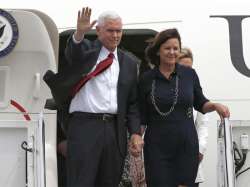US Vice President Mike Pence arrives in Japan, to focus on trade talks
Concluding a visit to South Korea, Pence told business leaders in Seoul the administration is taking a fresh look at trade agreements as part of its ‘America First’ policy.

US Vice President Mike Pence today arrived in Japan for talks, focusing largely on trade with America's anchor ally in the region.
Concluding a visit to South Korea, Pence told business leaders in Seoul the administration is taking a fresh look at trade agreements as part of its ‘America First’ policy.
"We're reviewing all of our trade agreements across the world to ensure that they benefit our economy as much as they benefit our trading partners," Pence told the American Chamber of Commerce in Korea.
White House officials said that the economic meetings with Deputy Prime Minister Taro Aso and other officials in Tokyo are meant to forge a framework for future discussions after the US withdrew from a Pacific Rim trade pact.
They will serve as the kick-off to the US-Japan economic dialogue that was announced by President Donald Trump and Prime Minister Shinzo Abe in February during latter’s visit to Washington.
While Japan's trade surplus with the US is much smaller than China's, Trump has decried the imbalance, especially in auto exports.
In Japan, they said that Pence's two main goals are to spur increased US access to Japanese markets and strengthen Japanese foreign investment. Both sides said that they do not expect the talks in Tokyo this week to delve into sector-by-sector talks on trade.
With no US Trade Representative yet in office and other key negotiator positions still unfilled, such nitty-gritty discussions will have to come later. But the meetings could indicate how forcefully the US will pressure Japan to further open its farm and automotive sectors.
Pence's advisers said the vice president would make the case to Abe and Aso that the US rejection of the Trans-Pacific Partnership, or TPP, under Trump did not signal a US withdrawal from trade and economic development in the region.
Before Pence's arrival, Aso told reporters the talks were meant to provide, "not friction, but cooperation."
In preliminary meetings on Tuesday, US Commerce Secretary Wilbur Ross sat down with Japan's Trade Minister Hiroshige Seko.
Ross has said he hopes to soon begin talks on a free trade agreement with Japan.
The loss of US participation in the TPP was a blow to Japan following strenuous negotiations, especially over opening access wider to its long-protected farm sector.
Chief Cabinet Secretary Yoshihide Suga told reporters over the weekend that Japan might push ahead with a revised, 11-nation version of the TPP despite the U.S. rejection of the trade accord.
As Indiana governor, Pence saw firsthand the impact of Japanese automakers Toyota, Honda and Subaru, whose factories employ thousands of people in his home state.
During his visit to South Korea, at the outset of his 10-day trip to Asia, Pence's attention mostly was directed at the North Korean situation.
While inspecting the Demilitarized Zone between North and South Korea, Pence warned Pyongyang that after years of testing the U.S. and South Korea with its nuclear ambitions, "the era of strategic patience is over."
Suga, the Japanese government spokesman, said Japan hopes to discuss policies on North Korea with Pence and to convey a growing sense of urgency over its missile tests and other actions.